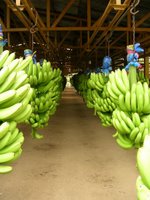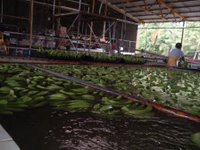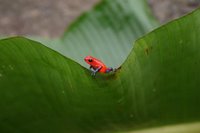Rice and Bean Melt-down
I have been eating rice and beans for just about every meal for four months now. They're not bad, but oh you wouldn't believe the things I would do for a bagel. It's finals week, so I'm studying and finishing up about three papers at the same time. Not too bad. We have had the most apocalyptic lectures this last week. The most terrible predictions from global warming I have ever heard, from a woman who discovered that higher temperatures decrease photosynthesis of all tropical plants, which means a positive feedback loop, which means droughts and floods and crazy weather like you've all already heard before. It also means the entire amazon basin forest, in her model, will rise in temperature 14C, photosynthesis in tropical forests globally will be pushed above its upper temperature limits, and the entire amazon basin, and the congo, and big partsof indonesia will die and turn to savannah. OK, the modeling is a little extreme, but the woman's work is rock solid, and that's the most terrifying thing I've heard in a long time.
 Today I visited a banana plantation. It was run by a university that was studying sustainable alternatives for bananas. That was really interesting. It was like a theme park, with giant bunches of bananas cruising along on a disneyland rail system, hanging in green and blue plastic bags with colored tags. Bananas dont have seeds, so every plant in an entire field is a clone of the same plant, grown basically by sticking chunks of meristem tissue in the ground. They grow from those chunks to trees and produce one giant bunch of bananas every nine months. Then they cut the entire stalk off, and a new one grows and does it again. Since it's such a huge monoculture, all the bananas are incredibly susceptible to diseases and dependent on artificial fertilizers. The good plantations can last 40 years before they sterilize the soil. Where we visited, they were really proud of their semi-organic bananas, that they only sprayed with fungicides thirty times a year, vs the usual 50 (that's every week, folks!), and mixed plant
Today I visited a banana plantation. It was run by a university that was studying sustainable alternatives for bananas. That was really interesting. It was like a theme park, with giant bunches of bananas cruising along on a disneyland rail system, hanging in green and blue plastic bags with colored tags. Bananas dont have seeds, so every plant in an entire field is a clone of the same plant, grown basically by sticking chunks of meristem tissue in the ground. They grow from those chunks to trees and produce one giant bunch of bananas every nine months. Then they cut the entire stalk off, and a new one grows and does it again. Since it's such a huge monoculture, all the bananas are incredibly susceptible to diseases and dependent on artificial fertilizers. The good plantations can last 40 years before they sterilize the soil. Where we visited, they were really proud of their semi-organic bananas, that they only sprayed with fungicides thirty times a year, vs the usual 50 (that's every week, folks!), and mixed plant matter with the soil to distract the pest nematodes, instead of using nematocides (there are a bunch of workers suing right now because they got sterilized by these in the 80s), and they use citrus extract to keep bananas green for shipping instead of some other fungicide. Sounded basically like this system was still swimming in creepy chemicals, but was a step in the right direction. If you do one thing for your environment, PLEASE pay the extra twenty cents for organic bananas! The people who process them were really interesting to watch. They have the assembly line down pat...just the fastest movements cutting, washing, sorting, trimming,
matter with the soil to distract the pest nematodes, instead of using nematocides (there are a bunch of workers suing right now because they got sterilized by these in the 80s), and they use citrus extract to keep bananas green for shipping instead of some other fungicide. Sounded basically like this system was still swimming in creepy chemicals, but was a step in the right direction. If you do one thing for your environment, PLEASE pay the extra twenty cents for organic bananas! The people who process them were really interesting to watch. They have the assembly line down pat...just the fastest movements cutting, washing, sorting, trimming, and packing the bananas as they cruised in on their amusement-park rails. Looked like it would get boring fast, but they were good at it.
and packing the bananas as they cruised in on their amusement-park rails. Looked like it would get boring fast, but they were good at it.So seeing the plantation was good. The apocalyptic part was comparing this with our reading about the socio-economic causes of deforestation... a lot of which related to the instability created by export-agribusiness, which have boom and bust cycles, and deforest land and attract immigrants during the booms, which they leave jobless, with no option but to try and homestead in yet more forests during the busts. Costa Rica, for example, is 28% national parks... pretty damn well protected compared to us at less than 2%... and yet they had the highest deforestation rate in the world over the last couple decades outside these parks. Basically, the point is that you cannot have conservation that just builds a wall around a few chunks of land, and lets the rest go to hell. It doesn't work in biological or human terms. The alternatives? A lot of smaller scale, more diversified
 farms, agroforestry and such. Reduced poverty, population growth, and social instability. None of which seem likely to happen without some kind of social and economic justice. Then I had a lecture on population growth. I'm not too worried about population growth. Global warming will kill us first. So saving the world proves yet again to be harder than anticipated. The forests still surprise me with tiny beautiful things. I got to see Cooper for the first time in months, and find myself still in love. I feel humbled, a little sleep deprived, and greatful for my rice and beans.
farms, agroforestry and such. Reduced poverty, population growth, and social instability. None of which seem likely to happen without some kind of social and economic justice. Then I had a lecture on population growth. I'm not too worried about population growth. Global warming will kill us first. So saving the world proves yet again to be harder than anticipated. The forests still surprise me with tiny beautiful things. I got to see Cooper for the first time in months, and find myself still in love. I feel humbled, a little sleep deprived, and greatful for my rice and beans.

0 Comments:
Post a Comment
<< Home